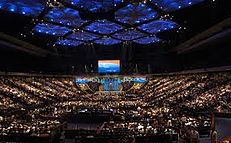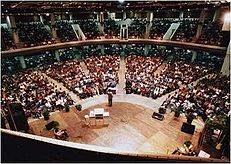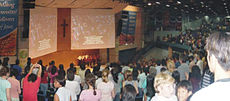- Nondenominational Christianity
-
In Christianity, nondenominational institutions or churches are those not formally aligned with an established denomination, or that remain otherwise officially autonomous. This, however, does not preclude an identifiable standard among such congregations. Non-denominational congregations may establish a functional denomination by means of mutual recognition of or accountability to other congregations and leaders with commonly held doctrine, policy and worship without formalizing external direction or oversight in such matters. Some non-denominational churches explicitly reject the idea of a formalized denominational structure as a matter of principle, holding that each congregation is better off being autonomous.
Non-denominational is generally used to refer to one of two forms of independence: political or theological. That is, the independence may come about because of a religious disagreement or political disagreement. This causes some confusion in understanding. Some churches say they are non-denominational because they have no central headquarters (though they may have affiliations with other congregations). Other churches say they are non-denominational because their belief structures are one of a kind.
Members of non-denominational churches often consider themselves simply "Christians". Non-denominationalism should not be confused with interdenominationalism, or ecumenism.
Contents
History
“ The visible church, in the idea of the Scottish theologians, is catholic. You have not an indefinite number of Parochial, or Congregational, or National churches, constituting, as it were, so many ecclesiastical individualities, but one great spiritual republic, of which these various organizations form a part. The visible church is not a genus, so to speak, with so many species under it. It is thus you may think of the State, but the visible church is a totum integrale, it is an empire. The churches of the various nationalities constitute the provinces of this empire; and though they are so far independent of each other, yet they are so one, that membership in one is membership in all, and separation from one is separation from all... This conception of the church, of which, in at least some aspects, we have practically so much lost sight, had a firm hold of the Scottish theologians of the seventeenth century.[1] ” Wherever the Protestant Reformation took place, the founders claimed that the result was not a new denomination but a reformation of a supposedly pre-existing "national" church.
Denominationalism was accelerated in the aftermath of the Westminster Assembly convened by the English Parliament to formulate a form of religion for the national churches of England and Scotland. In the debate between the two main parties present at the Assembly, the Presbyterians and the Independents, the Presbyterians were in favor of a form of church government that maintained the visible organizational unity of the Catholic Church while Independents, weary of the ecclesiastical tyranny they experienced under the Episcopal system, wished to organize the churches in a congregational way envisioning no legitimate authority of the church above the local congregation meeting at one time in a single place. Obviously these two parties were not reconciled and following the Assembly the Independents formed their own independent church. Thus instead of a united expression of the Catholic Church in England there were now two churches.
Protestant denominations spread and multiplied, especially in the United States, as Denominational confessional statements began to be used more to exclude than to include Christians with different doctrinal convictions.[citation needed] Each denomination maintains to differing degrees some form of organizational and visible unity with its member churches, albeit radically decentralized compared with the Catholic Church.
Today, non-denominational churches, like the Independents at the Westminster Assembly, refuse to recognize any ecclesiastical authority above the local congregation and deny the visible unity of the Church (though not the unity of the invisible Church) despite the fact that the original denominations were formed by substantially the same ideology.
Criticism
Boston University religion scholar Stephen Prothero argues that non-denominationalism hides the fundamental theological and spiritual issues that drove the division of Christianity into denominations in the first place behind a veneer of "Christian unity." He argues that non-denominationalism encourages a descent of Christianity—and indeed, all religions—into comfortable "general moralism" rather than being a focus for facing the complexities of churchgoers' culture and spirituality. Prothero further argues that it also encourages ignorance of the scriptures, which in turn reduces overall religious literacy, increasing the potential for inter-religious misunderstandings and conflict.[2]
Examples
The following organizations and institutions label themselves as non-denominational:
- Bread of Life Ministries International - non-denominational megachurch in Manila, Philippines, the church's mission and vision that love for God and sharing the Gospel are strongly linked to one's love of country, to be not only contented on spiritual needs and Heaven's promise, but also to be competitive, excellent and to be nationalistic as a nation.
- Brunstad Christian Church – The church claims to differ from other non-denominational groups through its belief that Jesus was tempted to sin just like every human being.
- Calvary Chapel — mildly charismatic, originating in California
- Christ's Commission Fellowship - non-denominational megachurch in the Philippines, they focus to be Christ Committed Followers.
- Christian Congregation in the United States - self-declared non-denominational, non-sectarian.
- Churches of Christ in Christian Union — focuses on free-form worship and evangelism
- Churches of Christ — associated with the Restoration Movement; known for sola scriptura, a cappella worship, and baptism for the forgiveness of sins.
- Crossroads Christian Church
- Cornerstone Fellowship — A non-denominational church in Livermore, California.
- Evangelical Christian Church in Canada (Christian Disciples)
- Family Stations, Inc. Identifies as a non-denominational, Christian radio ministry. Reformed, conservative, Calvinistic
- Gordon College (Massachusetts) — started by a Baptist church and once part of Gordon-Conwell Theological Seminary
- Christian churches and churches of Christ - also associated with the Restoration Movement like the Churches of Christ above. It is similar in all respects except for the use of instruments in worship as opposed to a cappella.
- Independent Fundamental Churches of America — association of conservative, independent churches
- Local churches — The local churches (Chinese: 地方教會) are a Chinese Christian movement influenced by the teachings of Watchman Nee and Witness Lee and associated with the Living Stream Ministry publishing house. Its members see themselves as separate from other Christian groups, denominations, and movements, part of what they sometimes call "the Lord's recovery"
- Newfrontiers — charismatic, of United Kingdom origin
- Open Bible Standard Churches — Pentecostal
- Open Brethren — non-charismatic, of UK origin
- Plymouth Brethren
- Sovereign Grace Ministries — identifies itself as "Reformed Charismatic"
- Victory Christian Fellowship - megachurch in the Philippines under Every Nation Ministries.
- Vineyard Movement — evangelical/charismatic
- World Changers Church International - originating in College Park, Georgia
While in general these groups will not have formal legal ties between individual congregations and consider themselves non-denominational, outsiders often describe them as denominations in and of themselves due to their close associations, equivalent doctrine, similar worship practices, and the ease of using one name to cover a larger group of churches.[citation needed]
See also
- Jesuism
References
- ^ Note that in this quotation the word "catholic" is used in the sense of "universal." Dr. James Walker in The Theology of Theologians of Scotland. (Edinburgh: Rpt. Knox Press, 1982) Lecture iv. pp.95–6.
- ^ Prothero, Stephen (2007). Religious Literacy: What Every American Needs to Know - and Doesn't. New York: HarperOne. ISBN 0060846704.
External links
Categories:- Christian group structuring
- Non-denominational Christianity
- Christian terms
Wikimedia Foundation. 2010.



